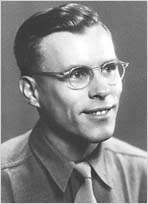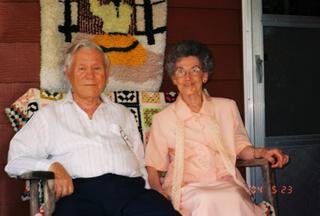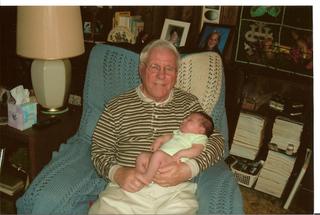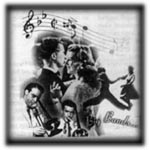
Carl Wendell Waldemar Peterson, son of Charles Alfred and Effie Helen Elizabeth Lundeen Peterson, was born Feb. 8, 1919, at Oxford, Isanti County, Minn. Carl's father, Charles, came to the United States as a 3-year-old from Sweden with his parents and other siblings. Carl grew up on his parents' farm in Chisago County, Minnesota, near Chisago City.
When his draft notice arrived in the mail, Carl worked as a nursing-home orderly at Bethesda Lutheran's Home for the Aging in St. Paul. The home provided medical care for elderly patients.
"The thought of the unknown and going off to war was scary," Carl said. Plus Carl's father died in December 1941. His draft added heartache for Carl and his recently widowed mother.
"When I got my notice that I was going to the Army I knew it would be rough," Carl said. "So I began praying that God would provide Christian friends to help me." Carl entered compulsory military service as a devout Christian and a conscientious objector to bearing arms on the grounds of religious principles.
"I knew God had answered my prayer when I met a fellow in our group on the train going to the induction center," Carl said. "I could tell he was a Christian by the way he talked and acted."
Carl's induction into the United States Army at Fort Snelling, Minn., was on Feb. 4, 1942, four days before his 23rd birthday, and the temperature was 20 below zero.
After arriving at Fort Leonard Wood, Carl met two other Christians, Art Kersey, from Marshalltown, Iowa, and Harry Weimer from Wiley, Colo. At Fort Wood, Carl worked as a hospital orderly before his assignment as a dental assistant. Harry and Art also worked in a dental clinic. Carl laughed, "We were like the Three Musketeers!"
On weekends the Christian friends decided to visit some area churches off base. Art was of the Assembly of God faith. Carl was Lutheran, and Harry attended the Church of God. Harry challenged Carl to alternate weekend visits to their denominational church services. "One Sunday we'll attend the Church of God. The next weekend we'll go to a Lutheran Church," Harry said. "OK," Carl agreed. "We'll do that."
They visited churches at Rolla and Jefferson City before they decided to visit Taylor Avenue Church of God in Lebanon. The Taylor Avenue church family adopted the visiting soldiers. They took them home after services, fed them lunch and befriended them. Through a young people's group at Taylor Avenue, Carl met Margaret Louise Medley and her parents, Raymond and Eva Medley. Later, Harry, Carl, Louise and her father, Raymond, sang together as a gospel-music quartet.
While stationed at Fort Leonard Wood, Carl became engaged to Louise in May 1944. Louise worked as a chief officer in the OPA government office in Lebanon. The office supervised the rationing of goods in the area.
Carl received transfer orders for overseas duty in September 1944. He went by train from Fort Leonard wood to Camp Chaffey at Fort Smith, Ark. After three months he transferred to Camp McCoy, Wis., to prepare for overseas duty. A week before Christmas, Carl left Boston aboard a new ship used to transport troops overseas. They landed at Southhampton, England.
Three weeks later Carl crossed the English channel, working 25 miles from the Battle of the Bulge. Carl remembers the bone-chilling inclement weather and the sharp winds that sliced through his clothing during his Army tour.
"At night I tried to get a spot near the tent's oil drum heater," he said. "I put my blankets under my sleeping bag because the ground was colder than the air."
While serving in Germany, Carl's classification was: Technician 5th Grade, Company D, 315th Medical Battalion, 90th Infantry Division. At the tent hospital they checked the injured troops, treated the ones who could return to their units after a few days, and transported the seriously wounded to hospitals. "It was difficult seeing the many injured and dying soldiers lying in those drafty tents!" Carl said.
Carl has a poignant memory of his outfit en route to a new location on a tense, dark, frigid night. He and the other troops were riding in the back of a big truck. A medical doctor was the unit commander. "We'd drive awhile then we'd stop," Carl said. "We started and stopped countless times until word came back -- we're lost!" About 2 or 3 a.m., they arrived at a remote military outpost. The outpost personnel warned the mobile medical unit, "You're 200 yards from the front line!"
"We turned around fast and drove back the other way," Carl said. With a look of amazement and awe in his voice, he continued, "We could have become prisoners of war that night."
While stationed in Germany, Carl met Salvador Diddio, an American soldier of Italian descent, working with the medical unit. He was also a dedicated Christian. Salvador spoke English, a bit of Italian and a little German. One day he told Carl he'd met a Christian German family -- a mother and her two daughters-in-law. The Germans invited Salvador and Carl to visit their home. Near the end of the war, food and supplies were scarce, but one evening the German family served them a meal of peppermint soup and hard bread. The mother's husband was an SS officer. The Schutzstaffel was an elite Nazi guard unit created to serve as bodyguards to Hitler. Her two sons were regular German soldiers. "The SS officer never came home while we were there, but the two sons did, and they were Christians, too," Carl said.
The German family, Carl and Salvador studied the Bible together. The Germans longed to memorize Psalms chapter one in English. Carl learned the chapter from their German Bible. "It would have been very different had we met on a battlefield," Carl said.
Near the end of the war, Carl's medical unit was located in Crimmitschau, Germany, before transferring to Weiden, Germany, 20 miles from the Czechoslovakian border. Shortly before Christmas 1945 Carl got orders to leave Germany. However, he missed getting home for Christmas. Homeward bound the ship hit heavy weather. The powerful waves tossed the ship about, causing it to creak as it rolled and pitched upon the stormy sea. That was Carl's first experience with the rigors of seasickness. With a laugh and a twinkle in his blue eyes he said, "There are three stages of seasickness. First, you feel as if you're going to be sick. Second, you are so sick you think you're dying. Third, you wish you could die!"
On his journey home, Carl met another Christian aboard ship. His new buddy advised Carl to keep food in his stomach to help ward off seasickness. "That was difficult to do," Carl said, "because they only fed us twice a day." Carl also remembers having to stand to eat his meals on the ship. The shipmate shared apples, pears and oranges with Carl to eat between meals, and the fruit did help settle his queasy stomach.
Carl received an honorable discharge at Jefferson Barracks in St. Louis on Dec. 29, 1945. During his overseas tour Carl and Louise wrote regularly. Before leaving Germany, Carl sent Louise three sets of fine china for her hope chest. Louise proudly said, "I still have our letters and the china."
As a civilian Carl lived in an apartment in Lebanon and worked at the Rice-Stix factory. Carl and Louise married June 22, 1946, at Lebanon. Carl had already felt the call of God to become a Church of God minister. Therefore, he used his GI Bill funds to attend Anderson College at Anderson, Ind., graduating June 15, 1950, with a bachelor of theology degree. He finished his GI Bill doing graduate work.
Carl feels blessed that he later pastored the churches at Jefferson City and Lebanon where he and Harry visited. The three Army buddies formed a lasting bond, keeping in contact over the years. Art Kersey died in 1999, but today Harry Weimer lives with his wife in Wiley, Colo.
Looking back, Carl said, "When I got my draft notice I thought it would ruin my plans for the future." Sitting nearby, Louise added in a soft, reflective voice, "The experience added a lot to his life. He found the Church of God, good Christian friends, became a pastor, and he found me."
In a V-Mail letter dated 7:15 p.m., Jan. 14, 1945, Carl wrote to Louise, "We know not the future in detail but we can guess a few things. Honey, the best I can say is, 'ye believe in God, believe also in me,' and rest in the Lord's faithfulness to take care of His own. Thanks for your prayers, honey, also for the prayers of the other believers back home. I believe most of my prayer help is coming from Lebanon -- All my love, Carl."
Carl and Louise Peterson have a daughter and son-in-law, Levonne Rae and Marshall Lee Morgan; three grandchildren, Kirk Wendell, Landon Royce and Moriah Lorinda Morgan.
Surely, one day these devoted soul mates will hear the gracious words: "Well done, faithful servants! Come. Reap your rewards!"



--Submitted by Bonnie Sue Medley









